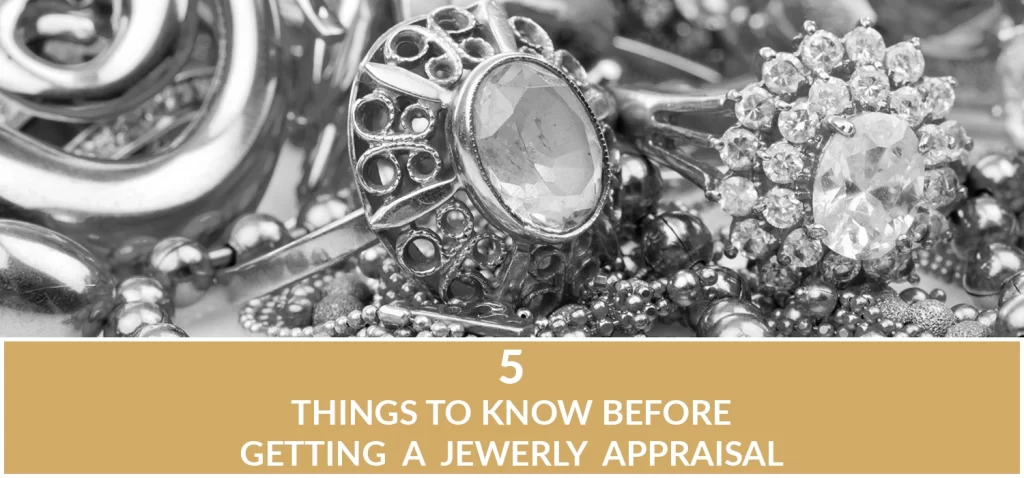
There are many reasons why you might need a jewelry appraisal. It may be that you need an appraisal for insurance purposes. Or, you may be liquidating some of your assets. Maybe you have gotten a divorce and need to know the value of your wedding band or engagement ring.
Whatever your reason, it is a good idea to start the process of jewelry appraisal with your eyes wide open and your head full of knowledge about the ins and outs of getting a jewelry appraisal, as well the different types of appraisals available.
Here are 6 things to know before getting a jewelry appraisal.
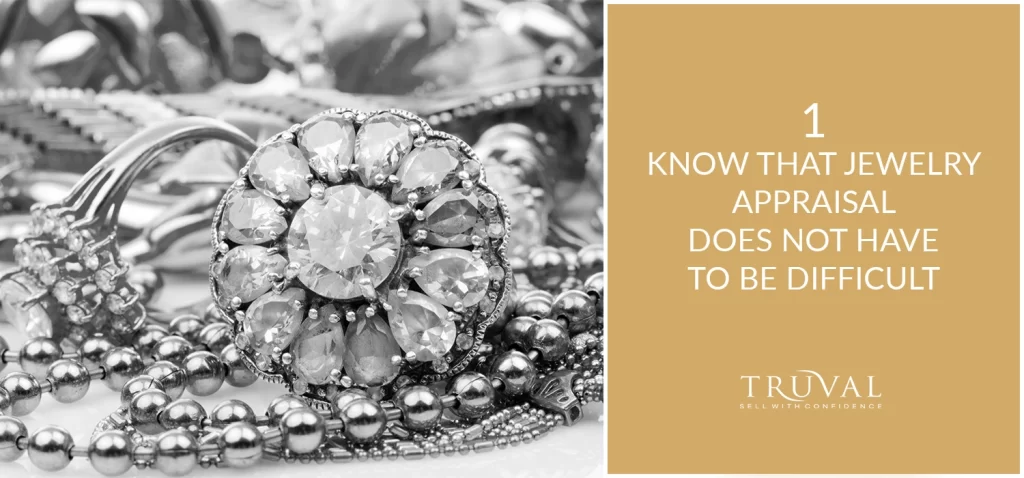
1. Know that jewelry appraisal does not have to be difficult
If you don’t know very much about what is involved with an appraisal, it can seem intimidating and overwhelming to be at the start of the process.
Before you begin, rest assured that there are ways to navigate jewelry appraisal that are painless and stress free. Many different businesses offer on site appraisal, and with today’s technology you can research the qualifications and reviews before you even set foot in the door.
Many people have successfully acquired an appraisal, either in person or with a secure mail-in option.
So although it may be new territory, you can move forward with your appraisal assured that you do not have to do it all on your own.
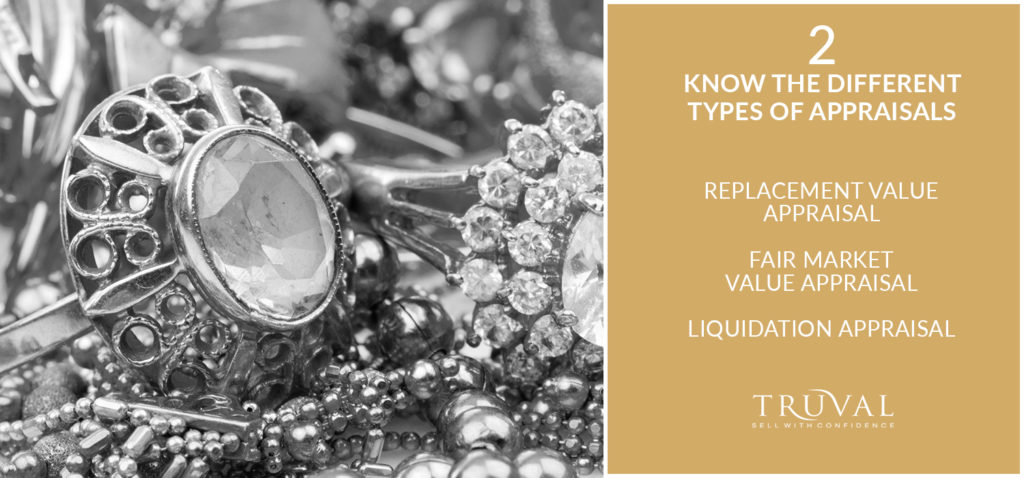
2. Know the different types of appraisals
When you get an appraisal, you will receive details and all pertinent information about your jewelry. The characteristics of your gem stone and documentation specific to your item.
Replacement Value Appraisal
Most appraisals are done for insurance purposes.
The value you receive is called the retail replacement value, and this value will tell you the cost of replacement for your jewelry in the event that something happens to your item.
The retail replacement value will be inflated and a much higher number than the resale value of your jewelry. First and foremost, this is due to the fact that the appraisal is an estimate of how much it will cost you to purchase a new replacement for your jewelry, as opposed to selling used jewelry. It’s also due to a number of factors, such as insurance premiums, market fluctuation, and the fact that the appraisals need to be valid for 10 years, during which the cost of replacing jewelry will increase.
Fair Market Value Appraisal
A Fair Market Value appraisal gives you an estimate of what you would receive if you sold your jewelry. It takes into account the condition of the jewelry, and is meant to give the seller a feel for how much they could get from a willing buyer. This amount will be lower than a Replacement Value Appraisal.
Liquidation Appraisal
If you need to quickly liquidate jewelry, whether due to a divorce or estate liquidation, you can get a Liquidation Appraisal. These appraisals are usually significantly lower, reflecting the immediate need to sell.
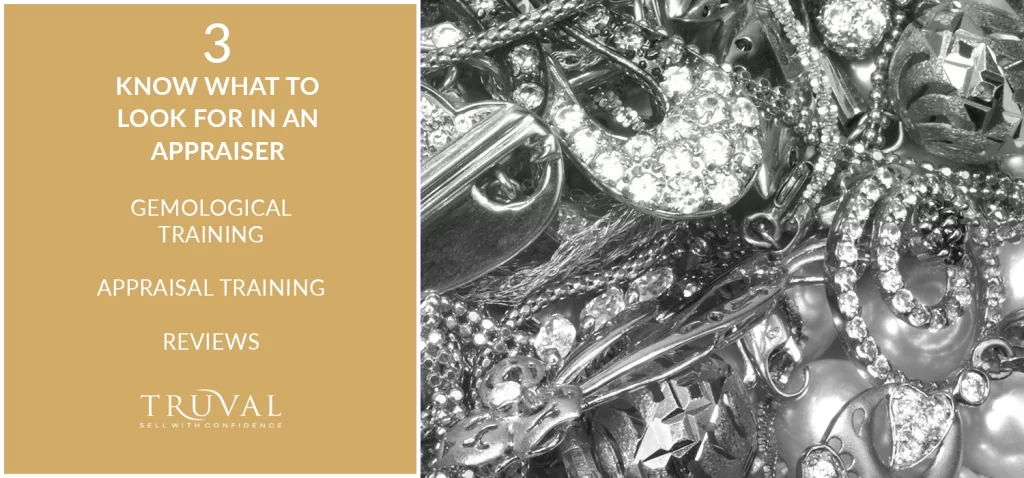
3. Know what to look for in an appraiser
Did you ever consider that the document you receive from an appraiser could likely be used in a legal situation? You do not want an appraisal that will not hold its credibility when the time comes.
Therefore, you need an appraisal from someone who has the knowledge and experience to give you a credible evaluation of your property. Your appraiser should have gemological training and experience as well as an understanding of how jewelry is made. They should also have appraisal training and come recommended by references or reviews.
- Gemological training – Is the appraiser a G.G. (Graduate Gemologist)? This is a minimum credential to look for in an appraiser. Do they have any specialties? Have they kept up their credentials with continuing education?
- Appraisal training – Has the appraiser completed appraisal training and testing in valuation and appraisal by a recognized association such as the ASA (American Society of Appraisers) or the National Association of Jewelry Appraisers?
- Reviews – One of the best ways to find out if a jeweler is reputable is simply to check out their online reviews. Google, Facebook, and Yelp are all great places to find the most reputable jewelry buyers.
Asking all these questions will help you determine whether or not the appraiser is not only educated and experienced but also trustworthy and honorable.
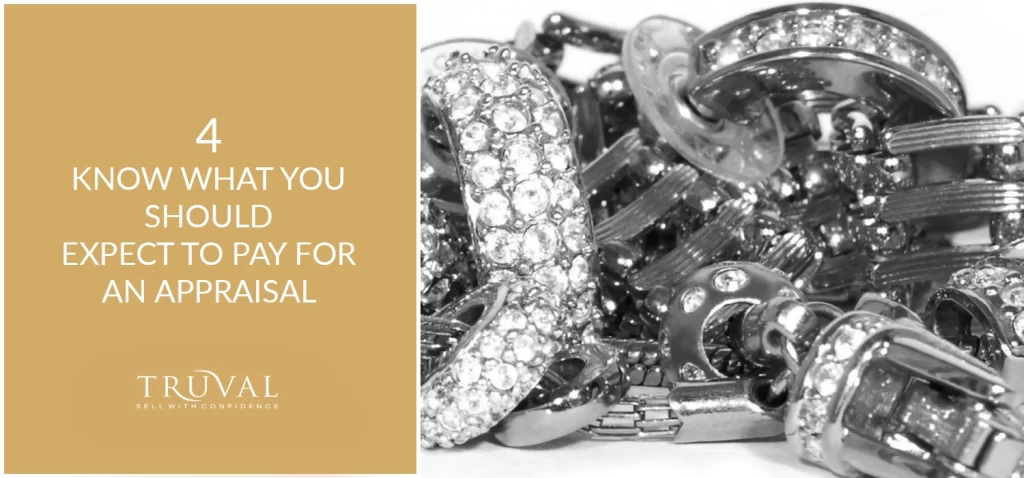
4. Know what you should expect to pay for an appraisal
However, if you only need an appraisal, there are a few things you need to know.
Because appraisers work independently, there is no standard. They can charge whatever they like. But there are considerations they should factor in, and you can ask them to break down their quote and tell you what those factors were that went into their decision of their fee.
- Their fee can be based on their expertise. An appraiser with more education and certifications can charge more because of their vast knowledge on the subject.
- Their fee can be based on the size of the item. An appraiser may tier their fee based on the size of a major diamond or other gem.
- Their fee can be a flat fee. If they are experienced, an appraiser may know from looking at the item what a fair cost for their appraisal would be.
- Their fee may be charged by the hour. An appraiser often has an hourly rate. Obviously a more complicated piece of jewelry will take longer to appraise than a simple gold band.
- Their fee should NOT be based on a percentage. An appraiser who bases their fee on a percentage of the value of the appraised item is using an unethical practice. If they do so, this would create a desire to appraise the item at a higher value so as to receive a higher feel. If you come across an appraiser who operates in this way, find another appraiser.
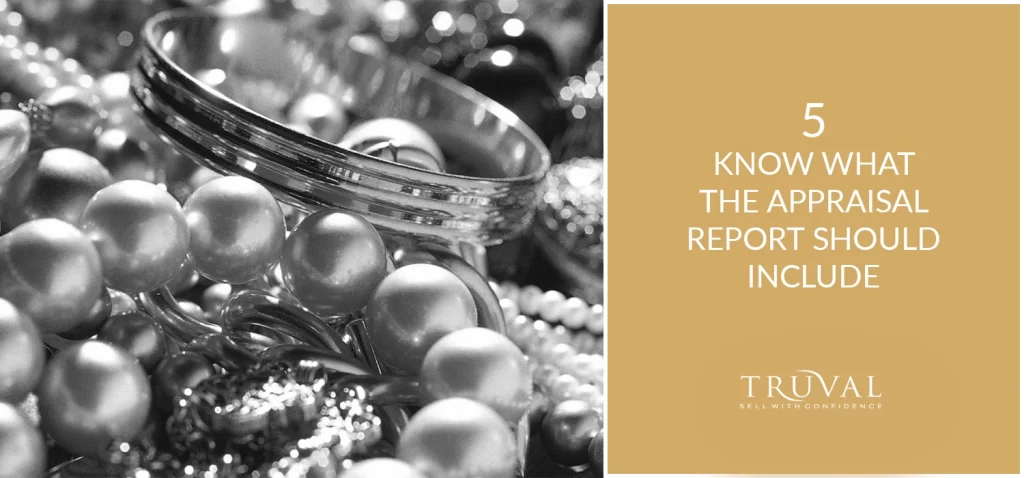
5. Know what the appraisal report should include
You can expect to find the following items in a report from an appraiser:
- Name and Contact information of Client – This will be your name, address, and any other contact information.
- The Date of the Appraisal – Because of the economy and jewelry market in general, the date of your appraisal is extremely important to the value of your item.
- Stated Purpose of the Appraisal – This will affect whether or not you receive the cash value, replacement value, or agreed value of your jewelry.
- A detailed description of the entire piece – Things that should be included are weight, grade, and measurement of each component. Also color grade if there is a gemstone in your item.
- Notes on your gemstone – If your item includes a gemstone, your report should tell you if it is natural or synthetic. Also, whether there were any treatments on your gemstone (or if it was untreated).
- Type of setting – Your appraisal report should state the type of setting of your item.
- Statement from the Appraiser – This would be included if the appraiser needs to add any kind of explanation or conditions. Also included may be names of anyone else who helped evaluate the item.
- Photograph of the Item – It is a good practice by appraisers to include a photograph of the item so there is absolutely no confusion which piece is being discussed and valued.
- Appraisal of the Jewelry’s Value – You will of course obtain the information you want and need- the value of your jewelry. Depending on why you have requested the appraisal and what you have communicated to your appraiser, you will get the corresponding value.
You might need the fair market value for your jewelry. Or, you might need to know the retail replacement value which would be the specific amount paid to you by your insurer should you have a loss of your item. Or, you might want to know the re-sale or second hand value of your jewelry.
It is important to note that the retail replacement value (which is for insurance purposes) will be inflated and a much higher number than the fair market value or resale value of your jewelry. This is due to a number of factors such as insurance premiums and market fluctuation. As well, the re-sale value will be even lower than (about 20-50% of) the fair market value. And this number is of course impossible to guarantee, as you only sell your jewelry if you find a buyer for it.
The appropriate forms – Available from JISO.org, there are different forms that will apply to whatever reason you are acquiring your appraisal. “The Jewelry Insurance Standards Organization is a non-profit organization established to serve the insurance industry by maintaining the integrity of jewelry insurance standards.” (jiso.org)
Conclusion
If you’re in need of jewelry appraisal, being in the know about the entire process will ensure that you get the best value of your jewelry. Knowing the right questions to ask and the expected qualifications of an appraiser will give you the assurance that you are choosing the best appraiser.
Seeking out an appraiser and having your jewelry appraised may take some time and effort on your part. But if you decide to sell your jewelry, or if your jewelry is ever stolen or lost, you will be glad you invested your time and energy into an accurate appraisal of your assets.
